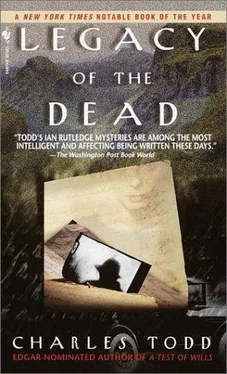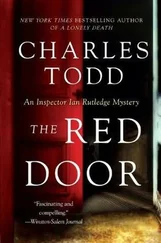Charles Todd - Legacy of the Dead
Здесь есть возможность читать онлайн «Charles Todd - Legacy of the Dead» весь текст электронной книги совершенно бесплатно (целиком полную версию без сокращений). В некоторых случаях можно слушать аудио, скачать через торрент в формате fb2 и присутствует краткое содержание. Жанр: Полицейский детектив, на английском языке. Описание произведения, (предисловие) а так же отзывы посетителей доступны на портале библиотеки ЛибКат.
- Название:Legacy of the Dead
- Автор:
- Жанр:
- Год:неизвестен
- ISBN:нет данных
- Рейтинг книги:5 / 5. Голосов: 1
-
Избранное:Добавить в избранное
- Отзывы:
-
Ваша оценка:
- 100
- 1
- 2
- 3
- 4
- 5
Legacy of the Dead: краткое содержание, описание и аннотация
Предлагаем к чтению аннотацию, описание, краткое содержание или предисловие (зависит от того, что написал сам автор книги «Legacy of the Dead»). Если вы не нашли необходимую информацию о книге — напишите в комментариях, мы постараемся отыскать её.
Legacy of the Dead — читать онлайн бесплатно полную книгу (весь текст) целиком
Ниже представлен текст книги, разбитый по страницам. Система сохранения места последней прочитанной страницы, позволяет с удобством читать онлайн бесплатно книгу «Legacy of the Dead», без необходимости каждый раз заново искать на чём Вы остановились. Поставьте закладку, и сможете в любой момент перейти на страницу, на которой закончили чтение.
Интервал:
Закладка:
Rutledge recalled the statement McKinstry had read to him. When she’d been asked if Fiona could have been pregnant when she left Brae, Mrs. Davison had answered unequivocally. “No. I would have known,” she’d said. “I kept a strict eye on Fiona-not because she was likely to find herself in trouble, but because she was a young girl, alone and in my care. Come to that, it wasn’t hard to do-she seldom took her day off, and even in the evenings, when the children were in bed, she’d sit with me and do the mending or read aloud.”
Oliver’s comment on Mrs. Davison’s character was “I’d take my oath that she’s telling the truth. Forthright to a fault, as my sergeant put it.”
Mrs. Davison might well have told the exact truth. People often did.
The whole truth was another matter. And how an investigating officer probed for it determined how much of it came out. Objectivity
…
Oliver was convinced that Fiona MacDonald was a murderess.
If she wasn’t, how did she come by the child? That was the stumbling block, and her life depended on the answer. And Rutledge was going to have to find it.
Brae was south and east of Glasgow, on the outskirts of an area that had suffered from fast expansion and then depression in the previous century. The basin of the Clyde had become a forest of steelworks, factories, and mines, but it had never been a scenic wonderland. All the same, what little beauty there was had been swallowed up long since. Lanark, on the other hand, was a pleasant town with associations with the Scottish hero William Wallace, and it was there that Rutledge ate a late dinner before continuing to Brae.
But there was no place in Brae to spend the night, and he was forced to return to Lanark.
It was early in the morning when he came back, and even Hamish could find nothing attractive in the plain houses, the dull landscape, or the feeling that time had dealt harshly with the little village. Even its few streets seemed tired.
Mrs. Davison lived in a brick house that had been well kept, one large enough to have been a manager’s home when industry had mushroomed in the region. The windows were clean, with pretty curtains behind them; there were flowers still in bloom in the sheltered garden to one side, and behind the house vegetables had been grown in long rows that were now brown and untidy except for the dark green of beets and cabbages at the far end. The house stood at the edge of the village, set back from the street behind a low brick wall. A ball, a doll with a china face and no clothes on its white kid body, and a small bucket full of stones littered the walk in front of the door.
She answered his knock herself, a woman with a kind face but very perceptive hazel eyes. She looked him up and down as he introduced himself and then said, “Yes, I’m Penelope Davison. I’ve talked to the policemen in Duncarrick. Why should London have any interest in going over the same ground? I know nothing about Fiona that can help you in any way.” In her own fashion, she reminded him of Lady Maude. The same independent spirit and refusal to be overawed by the law.
“All the same, there are some questions I must ask.”
She sighed and opened the door wider, inviting him in to the parlor, on the left side of the entry. It was small with dark furniture, a goodly number of green-leafed plants, and very little frivolity. There was a charcoal portrait of a man with fine mustaches and an air of importance, framed in oak and gilt; a small reproduction from a newspaper of Queen Victoria’s jubilee procession, framed in dark wood; and a bookcase with glass doors holding rows of calf-bound volumes, scuffed from much use, just under the window. The books had been tidily sorted by height, not content. But there was an air of calm and comfort in the room that impressed Rutledge as he took the chair she indicated.
From the back of the house he could hear the high voices of children, and realized suddenly that it was a Saturday and they were not in school. Hamish said, “You must speak to them-you gave Fiona your promise!”
Mrs. Davison was saying, “Well, then, you’ve come all this way. What is it you would like to know?”
“When Fiona MacDonald first came to live with you, did she have references? A letter of introduction?”
“She answered an advertisement I’d placed in the Glasgow paper in 1915. Her letter impressed me and I asked her to come for an interview. I liked her immediately, but I’m not a foolish woman, and I made inquiries before taking her on. Her grandfather was a respected man, and there were a number of people around Glencoe who spoke well of her. She came to me and I never had a moment’s regret over hiring her. I can’t bring myself to believe that she has killed anyone. But that police inspector claims she has.”
“There is evidence pointing in that direction, yes. It isn’t necessarily proven. That’s why I’m here. Did she have any friends in Brae? Young women she might have grown to know well?”
“No. She was grieving most of the time, you see, and she went out very little. Her brothers died one after the other, and then, in 1916, her young man. There was another woman here who used to walk with her when the weather was fine. But I wouldn’t have described Mrs. Cook as a friend. They were more-I don’t know-fellow sufferers. The newspapers pretended the war was going well, but too many people were dying. It’s a terrible weight when you worry day and night about someone. And when the news came, and Fiona knew the worst, it was hard for her to speak of it. She didn’t tell me for weeks. I think most of us pressed her to cry but she wouldn’t. Mrs. Cook didn’t press. She seemed to understand what it was like.”
“Tell me about Mrs. Cook, if you will.”
“She was ill-her lungs. As I understood it, her doctor had hoped that better air would help. The smoke of Glasgow most certainly had not. At any rate, early in 1916 she took rooms in that white house you must have passed coming into Brae. On your left. Mrs. Kerr’s sons were off to France, and her husband was away building ships. She didn’t want to live alone and advertised for lodgers. It seemed to suit both of them-Mrs. Cook was quiet and no trouble. Mrs. Kerr preferred it that way.”
“Do you know anything about Mrs. Cook’s background, where she’d come from?”
“Before Glasgow? I have no idea. Her husband was at sea, and Fiona’s young man was in France. They seemed to have very little in common other than that. I thought perhaps Mrs. Cook had come from a wealthy home and had been given advantages that Fiona hadn’t. Which is not to say that Fiona was common. She was a most unusual girl, and I found her a very pleasant companion. Her grandfather had reared her extraordinarily well!”
“How long was Mrs. Cook here?”
“Seven months, I’d say. Then her husband was invalided home, and she went to London to be with him.”
“Fiona had been living here for some time before Mrs. Cook came?”
“Of course. Over a year. And if you’re asking me if they might have known each other before moving to Brae, I seriously doubt it. Fiona left only after she’d had word that her aunt was taken ill and couldn’t manage the inn on her own any longer. She cried when she left, and my children cried with her. I was not above crying myself! That’s why I didn’t ask her to work out her time.”
Not to work out her time -but Fiona had told her aunt that she must!
“How long after Mrs. Cook’s departure was that?”
“Three or four months, I’d say.”
Hamish pointed out that if Mrs. Cook had been expecting a child when she came to Brae, then she had had it alone and without Fiona’s help. Seven months and four months added up to eleven.
Nevertheless, Rutledge made a note of it. He said, “Did Mrs. Cook leave a forwarding address, do you know?”
Читать дальшеИнтервал:
Закладка:
Похожие книги на «Legacy of the Dead»
Представляем Вашему вниманию похожие книги на «Legacy of the Dead» списком для выбора. Мы отобрали схожую по названию и смыслу литературу в надежде предоставить читателям больше вариантов отыскать новые, интересные, ещё непрочитанные произведения.
Обсуждение, отзывы о книге «Legacy of the Dead» и просто собственные мнения читателей. Оставьте ваши комментарии, напишите, что Вы думаете о произведении, его смысле или главных героях. Укажите что конкретно понравилось, а что нет, и почему Вы так считаете.












